Module4Revision
上海教育出版社小学英语三年级起点五年级上册 Revision 4-全国公开课一等奖

模块:Module 4 The natural world单元:Unit 11话题:Water单元教学概述教学目标:知识目标:1.学生能听、说、读、写本单元词汇:use, clothes, farmer,usef ul,up,shine,over, tree ,ground, grow crops, put out fires2.能用How do we use water?和We use water to…就水的用途问答。
3.能用At home/work,we use water to …谈谈在不同的场所水的用途。
4.能正确读出字母组合th在单词中的发音,并能迁移运用到其他含有th组合的单词拼读中。
语言技能:听:听懂有关水的用途的对话。
说:用How do we use water?询问水的用途以及用We use water t o …简单介绍水的用途。
读:1. 读懂介绍水的用途的对话,了解怎样询问和介绍水的用途。
2. 读懂故事《小水滴的旅行》。
写: 1.正确书写本单元的核心词汇。
2.正确书写本单元的核心句型:We use water to washour hands..3.能根据图片或词语的提示,运用句型We use water to…写写水的用途。
情感态度目标:了解水和人类的密切关系,意识到节约用水的重要性以及知道如何节约用水。
教学重、难点:重点:1.学生能听、说、读、写本单元词汇:use, clothes, farmer,useful,up,shine,over, tree ,ground,grow crops, put out fires2.能用How do we use water?和We use water to…就水的用途问答。
3. 了解字母组合th在单词中的发音。
难点:句型: We use water to wash our hands.中to与动词词组搭配使用。
课时划分:三课时教学课时分配:第一课时Listen and say, Look and learn第二课时Read a story第三课时Ask and answer ,Learn the sounds,culture corner第一课时教学内容:Listen and say, Look and learn教学目标知识目标:1.帮助学生学习Look and learn中的词组。
2020年外研版英语八年级上册Module-4单元教案
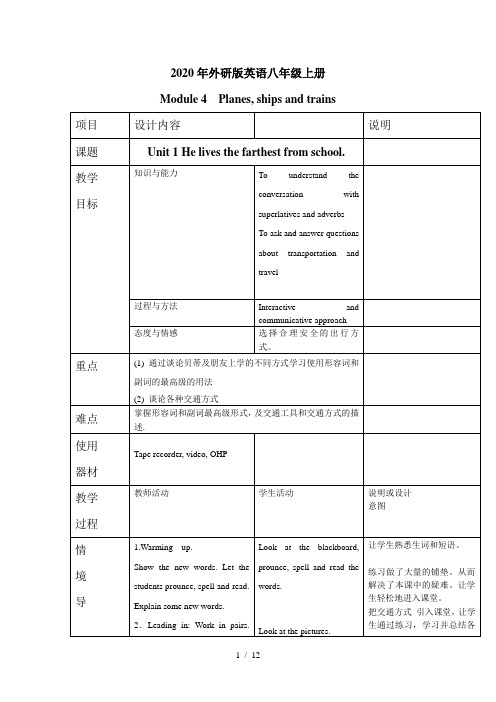
2020年外研版英语八年级上册Module 4 Planes, ships and trains教学课题:Module 4 Planes, ships and trainsUnit 2 What is the best way to travel?项目设计内容备注课时第 1 课时课型阅读课教具Tape recorder,OHP教学目标知识与能力To understand the passage on travel and transportation。
Tobe able to understand specific information in a textKey vocabulary: jouney, park, outside, however, costKey structures:The more information, the better.And it takes you about twelve hours to get there. It is thefastest and the second cheapest…过程与方法Interactive and communicative approach态度与情感通过学习,使学生能够比较各种交通方式,流利地和他人交流。
重点 1.本单元单词和短语。
2.形容词和副词的比较级及最高级的用法。
难点理解形容词和副词的比较级及最高级的用法。
教学手段方法Communicative教学过程教师活动学生活动说明或设计意图1.Warming up.Revision:How do yougo to school?2.Learn some new words.Look at the blackboard,Answer the questions.Look and say. Look at the blackboard,prounce, and spell read the words.让学生熟悉生词和短语。
revision
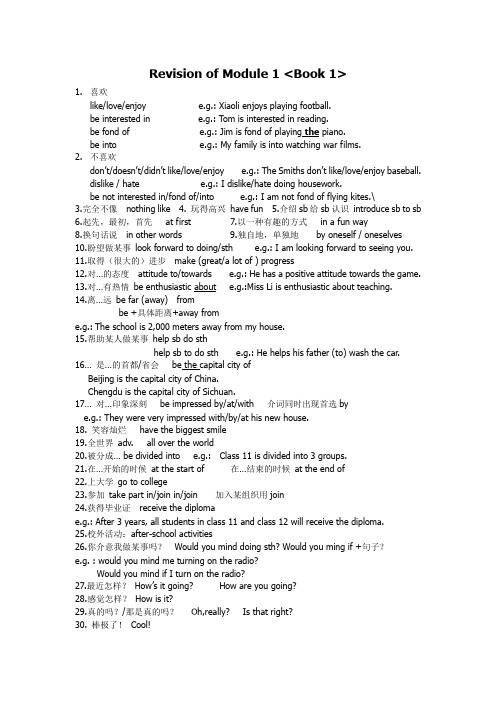
Revision of Module 1 <Book 1>1.喜欢like/love/enjoy e.g.: Xiaoli enjoys playing football.be interested in e.g.: Tom is interested in reading.be fond of e.g.: Jim is fond of playing the piano.be into e.g.: My family is into watching war films.2.不喜欢don’t/doesn’t/didn’t like/love/enjoy e.g.: The Smiths don’t like/love/enjoy baseball.dislike / hate e.g.: I dislike/hate doing housework.be not interested in/fond of/into e.g.: I am not fond of flying kites.\3.完全不像nothing like4. 玩得高兴have fun5.介绍sb给sb认识introduce sb to sb6.起先,最初,首先at first7.以一种有趣的方式in a fun way8.换句话说in other words 9.独自地,单独地by oneself / oneselves10.盼望做某事look forward to doing/sth e.g.: I am looking forward to seeing you.11.取得(很大的)进步make (great/a lot of ) progress12.对…的态度attitude to/towards e.g.: He has a positive attitude towards the game.13.对…有热情be enthusiastic about e.g.:Miss Li is enthusiastic about teaching.14.离…远be far (away) frombe +具体距离+away frome.g.:The school is 2,000 meters away from my house.15.帮助某人做某事help sb do sthhelp sb to do sth e.g.: He helps his father (to) wash the car. 16…是…的首都/省会be the capital city ofBeijing is the capital city of China.Chengdu is the capital city of Sichuan.17…对…印象深刻be impressed by/at/with 介词同时出现首选bye.g.: They were very impressed with/by/at his new house.18. 笑容灿烂have the biggest smile19.全世界adv. all over the world20.被分成… be divided into e.g.: Class 11 is divided into 3 groups.21.在…开始的时候at the start of 在…结束的时候at the end of22.上大学go to college23.参加take part in/join in/join 加入某组织用join24.获得毕业证receive the diplomae.g.: After 3 years, all students in class 11 and class 12 will receive the diploma.25.校外活动:after-school activities26.你介意我做某事吗?Would you mind doing sth? Would you ming if +句子?e.g. : would you mind me turning on the radio?Would you mind if I turn on the radio?27.最近怎样?How’s it going? How are you going?28.感觉怎样?How is it?29.真的吗?/那是真的吗?Oh,really? Is that right?30. 棒极了!Cool!1: 在某事上同意某人:agree with sb about/on sthe.g.: Miss Green agree s with his husband about/on the choice of trip.同意某事/做某事:agree to sth/do sth e.g.: They agree to take a walk after dinner.达成一致:agree on e.g.: They agree on the decision.2.确保(一般接句子或短语):make sure e.g.: You should make sure you have turned off the lights. 确保(短语、名词):make sure of e.g.: The police will make sure of the safety of the public. 一定要做某事: be sure to do sth e.g.: You are sure to finish the homework.3.对…第一印象: one’s first impression of sb/sth对…印象深刻:be impressed by/with/at e.g.: I am impressed by/with the nice scenery. 给…留下深刻印象:be impressed on e.g.: The nice scenery is impressed on me.4.避免做…:avoid doing e.g.: Tom avoids being late by taking a bus.5.取得…进步:make (great/rapid/good) progress6. dare:敢于,胆敢a).实义动词,否定句和疑问句,后可跟to的不定式,也不带to她敢一个人去那里吗?Does she dare (to) go there alone?她不敢回答。
2012高中英语一轮复习 Revision of Module4学案 外研版必修2
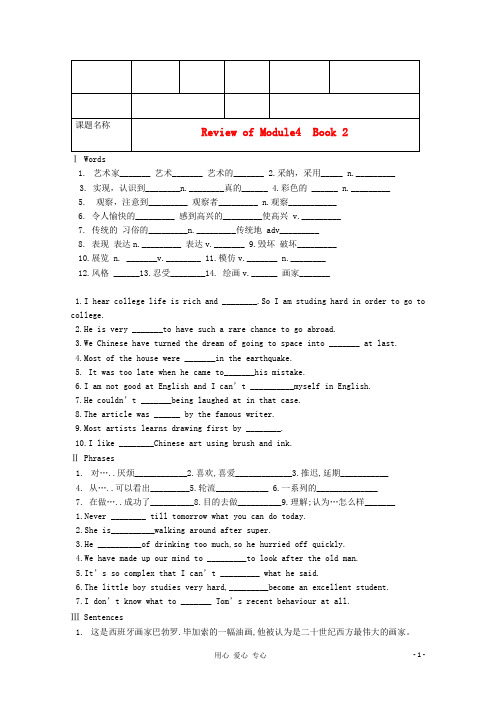
Ⅰ Words1.艺术家_______ 艺术_______ 艺术的_______2.采纳,采用_____ n._________3. 实现,认识到________n.________真的______4.彩色的 ______ n._________5. 观察,注意到_________ 观察者_________ n.观察___________6. 令人愉快的_________ 感到高兴的_________使高兴 v._________7. 传统的习俗的_________n._________传统地 adv_________8. 表现表达n._________ 表达v._______ 9.毁坏破坏_________10.展览 n. _______v.________ 11.模仿v._______ n.________12.风格 ______13.忍受________14. 绘画v.______ 画家_______1.I hear college life is rich and ________.So I am studing hard in order to go to college.2.He is very _______to have such a rare chance to go abroad.3.We Chinese have turned the dream of going to space into _______ at last.4.Most of the house were _______in the earthquake.5. It was too late when he came to_______his mistake.6.I am not good at English and I can’t __________myself in English.7.He couldn’t _______being laughed at in that case.8.The article was ______ by the famous writer.9.Most artists learns drawing first by ________.10.I like ________Chinese art using brush and ink.Ⅱ Phrases1.对…..厌烦____________2.喜欢,喜爱_____________3.推迟,延期___________4. 从…..可以看出_________5.轮流____________6.一系列的______________7. 在做…..成功了__________8.目的去做__________9.理解;认为…怎么样_______1.Never ________ till tomorrow what you can do today.2.She is__________walking around after super.3.He __________of drinking too much,so he hurried off quickly.4.We have made up our mind to _________to look after the old man.5.It’s so complex that I can’t _________ what he said.6.The little boy studies very hard,_________become an excellent student.7.I don’t know what to _______ Tom’s recent behaviour at all.Ⅲ Sentences1.这是西班牙画家巴勃罗.毕加索的一幅油画,他被认为是二十世纪西方最伟大的画家。
Revision教案
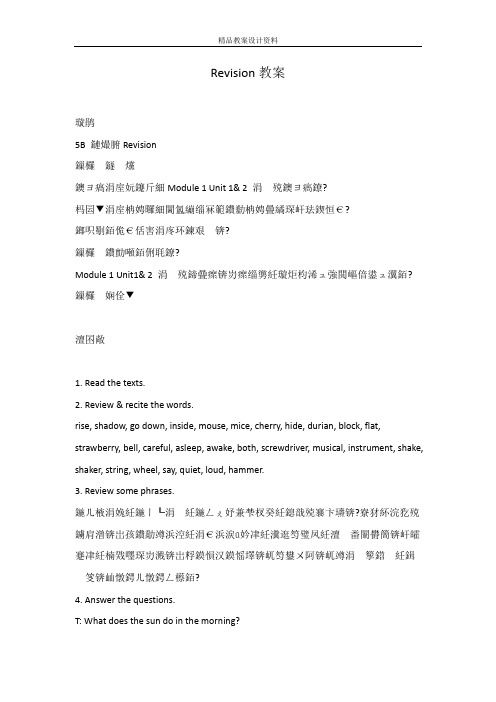
Revision教案5B 鏈熶腑Revision鐭ヨ瘑涓庢妧鑳斤細Module 1 Unit 1& 2 ?杩囩▼涓庢柟娉曪細閫氳繃缁冧範鐨勬柟娉曡繘琛屽珐鍥恒€???Module 1 Unit1& 2 ?澶囨敞1. Read the texts.2. Review & recite the words.rise, shadow, go down, inside, mouse, mice, cherry, hide, durian, block, flat, strawberry, bell, careful, asleep, awake, both, screwdriver, musical, instrument, shake, shaker, string, wheel, say, quiet, loud, hammer.3. Review some phrases.?寮犲紑浣犵殑?4. Answer the questions.T: What does the sun do in the morning?T: How is the shadow in the morning?T: Where is your shadow in the evening?T: Does the sun go down in the evening?T: Where is your book?T: What have you got? etc.5. Exercises?sour, in front of , behind, do not, stand, smoke, glass, one1. Danny ____ like limes. They鈥檙e too _______.2. Peter is tall. Ben is short. Ben _____ __________ Peter.3. My father likes ______. It鈥檚bad for him.4. Miss Fang can鈥檛see her ______. They鈥檙e on her head.5. The block鈥檚shadow is long in the morning. It鈥檚_____ the block.6. Do you want any strawberries? Yes, I want sweet ___________.鏀瑰彉鍙ュ瀷1. There are some green plums inside the box. (涓€闂? 鍚﹀洖)_____________________________________2. Grandma has got some durians in her handbag. __________________________3. He comes home at 4:00 in the afternoon.(when) ___________________________4. Mr. Chen eats a lot of fruit every day.(鍚﹀畾鍙? ___________________________5. Jim, please cut out the shadow. (鏃?____________________________瀹屾垚瀵硅瘽A: Look at _____ _______. It鈥檚short in the afternoon.B: Yes, the sun _______ _______ now.A: When ______ the sun _______ ________.B: At about 6:00 in the evening.A: _______銆€______ the shadow at that time?B: It鈥檚________.6. Check.?1. Module 1 Unit 1,2€鍗曪紝瀛︾敓鎺屾彙杈冨ソ銆?2. ?3. im, please cut out the shadow.锛堢幇鍦ㄨ繘琛屾椂锛変腑鏈変簺瀛︾敓娌℃湁鎶妏leaseх粌涔犮€?5B 鏈熶腑Revision鐭ヨ瘑涓庢妧鑳斤細Module 1 Unit 3 & 4????Module 1 Unit 3 & 4嬨€?澶囨敞1. Read the texts.2. Review & recite the words.fluffy, shiny, warm, parcel, thing, lunch box, mine, yours, ours, theirs, his, hers, its, cushion, move, touch, with, tongue, adventure, lost, find, save, different, help, beanstalk, same, giant, goose, grow, poor, rich, castle, golden.3. Review some phrasesу矝涓綇鍦ㄥ煄鍫¢噷锛屼笅铔嬨€?4. Answer the questions.T: How are you today?T: How does the desk feel?T: How is the apple?T: How do the pineapples feel?T: How are these cats?T: Whose book is this?T: Is this book yours?T: Are these books theirs?T: What do you do with your eyes?T: What does he do with his eyes?T: Are they the same or different?T: Can you see a giant in the castle?5. Exercises1. His birthday is on the _________(three) of February.2. Alice ________(go) to the park in the morning.3. How many ________(man) are there? There is one.4. Look, they __________(ride) bicycles there.5. These ________(one) are cheap. I like _______. (they)6. Ben can ________(wash) his clothes. He often _______(wash) on Sundays.7. Don鈥檛_______(jump), Kally. This sign means 鈥漀o _________鈥? (jump)8. They are from different ____________. (family)鍐欏嚭涓嬪垪鍗曡瘝鐨勯煶鏍?taste / / touch / /help / / where / /鏀瑰彉鍙ュ瀷1. Mike, please walk in the park. (鍚﹀畾鍙?2. My father is reading the newspaper in the chair.3. Betty has some desserts at break. (涓€闂? )4. They like the purple and yellow insect.5. The dog can smell with its nose.6. The birds are flying above the mountain. (what)瀹屾垚瀵硅瘽A: Mum, I鈥檓_____. Can I ________ ________ juice, please?B: Yes, please.A: Oh, Mum. ________ _______ any juice in the bottle.B: _______ some milk. A: OK!B: It鈥檚_______ time. What do you want for dinner?A: A bowl of _______ and some _________.B: All right.6. Check.?1. ?2. ?3.hey are from different_______(family).瀛︾敓娌¤兘鍐欏嚭澶嶆暟銆?5B 鏈熶腑Revision鐭ヨ瘑涓庢妧鑳斤細Module 2 Unit 1& 2 ????Module 2 Unit 1& 2 ?澶囨敞1. Read the texts.2. Review & recite the words.favourite, feed, kilo, hay, corn, cage, gate, branch, breakfast, along, left, right, up, down, step, rainbow, hotel, holiday, plant houses, dinosaur, soldier, puppet, visit, skateboard, computer, Gameboy.3. Review some phrases氬皯姘达紝寮8锛?0锛屽湪鏍戞灊涓婏紝璧颁笂鍙伴樁锛屽僵铏归厭搴楋紝浜氬崡屾墍鏈夌殑娲嬪▋濞冦€?4. Answer the questions.T: What time do you get up?T: What do the tigers eat?T: How much meat do they eat?T: What does a monkey eat?T: How much fruit does a monkey eat?T: Excuse me, where is Moon Park?T: Which doll do you like?T: What colour is the small dinosaur?T: Who has a computer?T: How many girls in our class have a bicycle?5. Exerciseslive, want, visit, have, be, tooth, dinosaur, what, whose, which1. On Sunday, Ben and Kitty ________ Grandma.2. My friend ______ some glue and some paper for the art class.3. Peter and Danny have two big apples. But Kitty _________ a small one.4. There ______ some tape and some keys on the desk.5. Our teacher _______ in Pudong.6. Both ________ are green and brown.7. ______ doll do you like, Kitty? This one.8. _______ is in the box? Some toys.9. _______ robots are these? Sorry, I don鈥檛know.10. The tiger is big. Its _______ are sharp.瀹屾垚瀵硅瘽1. A: Which fruit ____you like?B: I _______ strawberries.A: Do you like the big ______ or the _____ ones best?B: I like the ______ _______ best.2. A: ________ me. Where鈥檚Moon Park?B: Walk ______ Yanan Road. ______ a small road. ______ up the steps. It鈥檚Moon Park.鏀瑰彉鍙ュ瀷1. Is that long rope in your bag?(?2. We can see some trees on the hill. (what)3. ________________? She likes all the soldiers.4. It鈥檚Monday today.5. There is an old doll in the box. (how many)6. Check.?1. ?2. ?3.х?。
小学英语牛津沪教版(三起)四年级上册 Module 4 Revision 4课件(25张PPT)
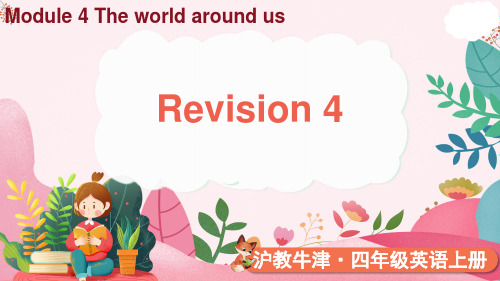
S1: How many stars are S1: _H_o_w_m__an_y__sq_u_a_r_es_
there?
_a_re__th_e_r_e_?
S2:T_h_e_r_e_a_r_e_f_iv_e_s_t_a_r_s. S2: There’s one square.
Think and write
How many
circles squares stars
are there ?
circle
There’s
one square
three
.
There are five stars
Let’s revise(Ⅰ)
How’s the weather ?
rainy It’s hot and sunny
.
Think and write
Module 4 The world around us
Revision 4
沪教牛津·四年级英语上册
Words
park
restaurant supermarket
Words
circle
square
star
rectangle triangle
Words
wind/windy
sun/sunny
cloud/cloudy
6. 这是一个圆形。我能在它里面画一个橙子。 _T_h_is_i_s_a__c_ir_cl_e_._I_c_a_n_d_r_a_w__a_n_o_r_a_n_g_e_i_n_i_t.
Sentences
7. 天气怎么样?温暖且阳光充足。 H__o_w_’_th_e__w_e_a_t_h_e_r?__It_’s_w__a_rm__a_n_d__s_u_n_n_y_. _
外研高中英语教材语法顺序 表

tenses 复习 的转化 and past 将来进行 复习一般 have done
现在时态 2 will/be forms被动 时
现在时、 词组didn’t
2 adjectives going to 语态
现在进行 need to do
ending in - for future 2 subject
时,现在 和 needn’t
ing and -ed actions and verb
完成时 have done
以-ing和- 一般将来 agreement
的区别
ed结尾的 时
主谓一致
形容词
Module 2
1verbs followed by -ing 后接-ing的 动词
1 the 1 link
infinitive words 状
Module 1 present 1 -ing 1 infinitive 1 revision 1 review 1 present
4
perfect
form and 不定式 of the of the perfect
tense 1 现 the
2 but + passive passive progressive
句
reason whom,in
原因状语 which 限
从句
制性定语
从句中of
whom, in
which
Module 1
1 adverbs 1 non- 1 may 1 review 1
6
compound of
defining have/
of
subjunctive
words 合成 frequency attributive might
6A Module 2 Unit 4 Revision
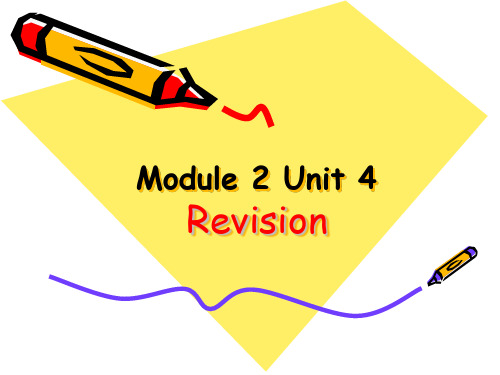
VI. Translate the following into English:
1. 搬进一个新公寓
2. 几点
3. 带你参观我们的小区
4. 五分钟的路程 5. 乘地铁 6. 坐公共汽车去上班
2. Which block is Jenny moving into?
3. Which flat does Kitty live in?
4. How about Jenny’s flat? 5. What about Kitty’s flat? 6. Does Kitty’s grandma live with her? 7. Is Flat A larger than Flat B? 8. How is this estate?
III. Choose a right answer:
1. Don’t ________ your car near the crossing. (driving/ stop )
2. You can __________ the road slowly. (walk across/ across) 3. They went to the bus stop and _____ a bus. (got off/got on)
4. We haven’t a lot of time. Let’s go __________. (loudly/quickly)
5. I saw your puppy on my __________ .(way to home/way home) 6. This street is busy, but that street is ________. (busyer/busier)
4. Helen is young. Kitty is younger. (并成一 句)
选修8Module4主,宾,表,同位从句

I don’t know about the man, Mr. White.
在复合句中起名词作用的从句叫名词性从句 (Noun Clauses)。名词从句的功能相当于 名词词组, 它在复合句中能担任主语、宾语、 表语、同位语、介词宾语等,因此根据它在 句中不同的语法功能,名词从句又可分为: 主语从句、宾语从句、表语从句和同位语从句。
1.主语从句
引导词:
1.从属连词:that, whether 2.疑问代词:what, which, who, whom, whose
3.疑问副词:when, where, why, how
4.复合关系代词:whatever, whichever, whoever, whomever
宾语从句
一,引导词: 1.从属连词:that, whether, if
二.名词性从句连接词的用法
连接词 可使用的 是否充当 名词性从 从句的句 句 子成份 否 可否省略 可否用其 他词代替
主/宾/ 表语从 句 whether 主/宾/ 表语从 句 特殊疑问词 主/宾/ what/where/ 表语从 when/which等 句
that
动词后的宾语 从句可以省略 否
否
Revision
Find the sentences using subject clause and Predicative clauses.
名词性从句
• 名词性从句在功能上相当于名词 主语
{What he does is important {
This is his job.
His job is important.
it作形式主语和形式宾语
填写句子 1. I think _____ worthwhile that we spent so much money
外研版(一起)六年级英语上册《Module4Revision》教案设计
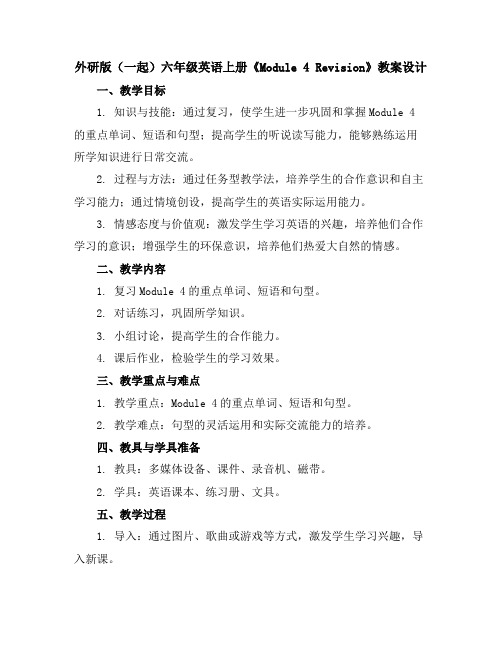
外研版(一起)六年级英语上册《Module 4 Revision》教案设计一、教学目标1. 知识与技能:通过复习,使学生进一步巩固和掌握Module 4的重点单词、短语和句型;提高学生的听说读写能力,能够熟练运用所学知识进行日常交流。
2. 过程与方法:通过任务型教学法,培养学生的合作意识和自主学习能力;通过情境创设,提高学生的英语实际运用能力。
3. 情感态度与价值观:激发学生学习英语的兴趣,培养他们合作学习的意识;增强学生的环保意识,培养他们热爱大自然的情感。
二、教学内容1. 复习Module 4的重点单词、短语和句型。
2. 对话练习,巩固所学知识。
3. 小组讨论,提高学生的合作能力。
4. 课后作业,检验学生的学习效果。
三、教学重点与难点1. 教学重点:Module 4的重点单词、短语和句型。
2. 教学难点:句型的灵活运用和实际交流能力的培养。
四、教具与学具准备1. 教具:多媒体设备、课件、录音机、磁带。
2. 学具:英语课本、练习册、文具。
五、教学过程1. 导入:通过图片、歌曲或游戏等方式,激发学生学习兴趣,导入新课。
2. 复习:带领学生复习Module 4的重点单词、短语和句型,巩固所学知识。
3. 对话练习:组织学生进行对话练习,提高学生的听说能力。
4. 小组讨论:分组讨论环保问题,培养学生的合作意识和自主学习能力。
6. 课后作业:布置课后作业,巩固所学知识。
六、板书设计1. Module 4 Revision2. 重点单词、短语和句型列表。
3. 对话示例。
4. 小组讨论主题。
七、作业设计1. 听力练习:听录音,完成练习题。
2. 口语练习:模仿对话,进行角色扮演。
3. 写作练习:根据所学内容,编写短文。
八、课后反思1. 教学过程中,关注学生的参与度和兴趣,及时调整教学方法。
2. 课后检查学生的作业完成情况,了解学生的学习效果。
本教案设计旨在通过复习Module 4,使学生巩固所学知识,提高英语实际运用能力。
Module4Unit1Helivesthefarthestfromschool课件初中英语八年级上
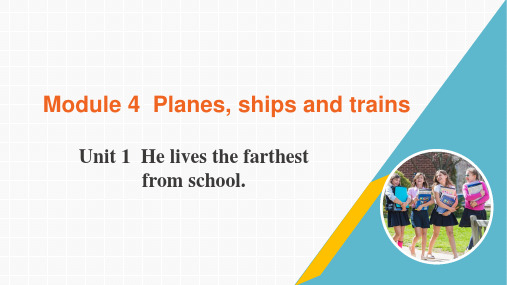
close adj. (距离上)近的,接近的 adv.(距离上)接近地
3
Pre-listening
Present the new words and phrases
take a bus/by bus
take the underground
walk/on foot源自4Pre-listening
Present the new words and phrases
bike bus cheap comfortable crowded expensive fast popular safe taxi underground walking
—What’s the most expensive way to go to school? —Going by taxi is the most expensive.
How do you go to school?
I take a bus to school.
8
Pre-listening
9
While-listening
Listen and match the words in the box with the pictures in Activity 1. You need to use one word more than once.
road n. 路;(尤指)公路
accident n. 交通事故;意外事件
except prep. 除……之外
choice n. 选择
classmate n. 同班同学
all the time 一直;不断地
crowded adj. 拥挤的;人数过多的
far adv. 远;遥远 adj. 远的;遥远的 far from远离
牛津高三英语复习nana.Module4 Unit2 Revision

• 1. 无论你说什么语言,来自世界各地的运动员都 ______ (separated Vs separate) 能参加。 the cost, I will achieve my goal. lead separate lives ______ much we tried, he didn’t approve. • Athletes form around the world can take On _________ language ______ the season, he wears speak. _______ ________ part,3 whateveroccasions they that The coupleshoe. particular are _______ but not divorced. • 2.为纪念希腊主神宙斯的妻子,未婚女性则容许 The bad apples are he wants. Bring him _______ _______ from the nice 在一个不同的(s)节日参加她们自己的比赛。 ones. he stands, he must have takeown ______ his part • Unmarried women were allowed to _______in reason. their own competition at aseparate festival _______ in honor of the wife. • 3.奥运会能促进所有的国家和人民和平相处。 • The Olympics would make it possible for ________ countries and people to live peacefully __________. (The Olympics ___ vital to us. ) side by side are
外研五年级英语上册教案Module4
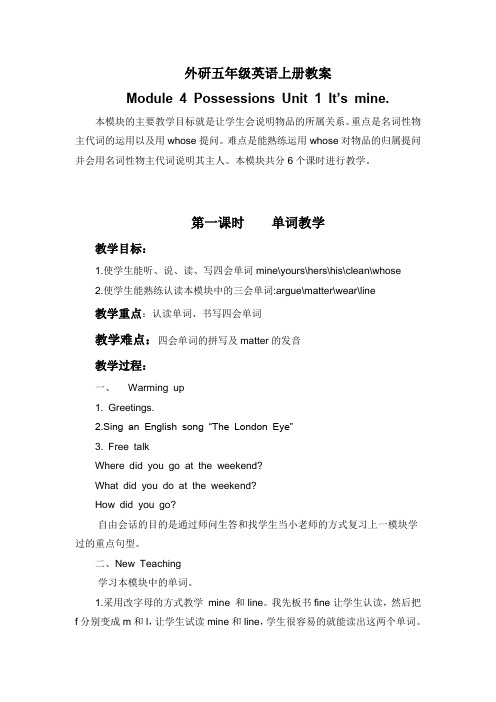
外研五年级英语上册教案Module 4 Possessions Unit 1 It’s mine.本模块的主要教学目标就是让学生会说明物品的所属关系。
重点是名词性物主代词的运用以及用whose提问。
难点是能熟练运用whose对物品的归属提问并会用名词性物主代词说明其主人。
本模块共分6个课时进行教学。
第一课时单词教学教学目标:1.使学生能听、说、读、写四会单词 mine\yours\hers\his\clean\whose2.使学生能熟练认读本模块中的三会单词:argue\matter\wear\line教学重点:认读单词、书写四会单词教学难点:四会单词的拼写及matter的发音教学过程:一、Warming up1. Greetings.2.Sing an English song “The London Eye”3. Free talkWhere did you go at the weekend?What did you do at the weekend?How did you go?自由会话的目的是通过师问生答和找学生当小老师的方式复习上一模块学过的重点句型。
二、New Teaching学习本模块中的单词。
1.采用改字母的方式教学mine 和line。
我先板书fine让学生认读,然后把f分别变成m和l,让学生试读mine和line,学生很容易的就能读出这两个单词。
之后,我拿出一根绳子边指边chant: line line It’s a line.学生马上就知道line 的意思是“绳子”。
我再举起我的英语书说:“This English book is mine.”然后拿着书指着班上的一个学生于晓惠边摇头边说:“It isn’t Yu Xiaohui’s.”相信通过这两个句子加上老师的肢体语言学生就会了解mine的意思是“我的”。
2. 采用加字母的方式教授yours\hers\whose\wear。
外研版(三起)三年级英语上册Module 4 课件

It
is
It’s
It’s blue.
It’s green. It’s yellow.
Game.
运气球
以组为单位,从每组选一位同学,这两位同学用手托气球,
并用“It’s …”造句,气球掉下之前说的最多者为优胜者。
Watch the video.
Point to the colour your hear.
Try to do.
一、根据图片选单词。 A. black B. red C. green D. yellow E. blue
(B) (E) (C) (A) (D)
二、根据图片选单词。
( C) 1. It’s _____.
A. red B. yellow
( B) 2. It’s _____.
A. green B. blue
Homework
1.背过本课新单词。 2.请家长指出家中含有红、黄、绿、黑、蓝 颜色的物品,练习描述颜色的句子It’s …
第二课时
Revision.
black
blue
yellow
green
red
It is…
Game.
眼疾手快
老师发出指令,例如:It’s red,同学们要找到相应颜 色的物品并指出来,看谁反应最快,最快的加分奖励。
外研版·英语·三年级上册
Module 4 Unit 1 It’vision.
Good morning.
Good morning.
What’s your name?
MySIna’ammm.Seaims .
新学期开始,询问新同学名字。
New words.
panda
Now it’s blue.
外研版八年级英语上册 Module 4 Unit 3 教案
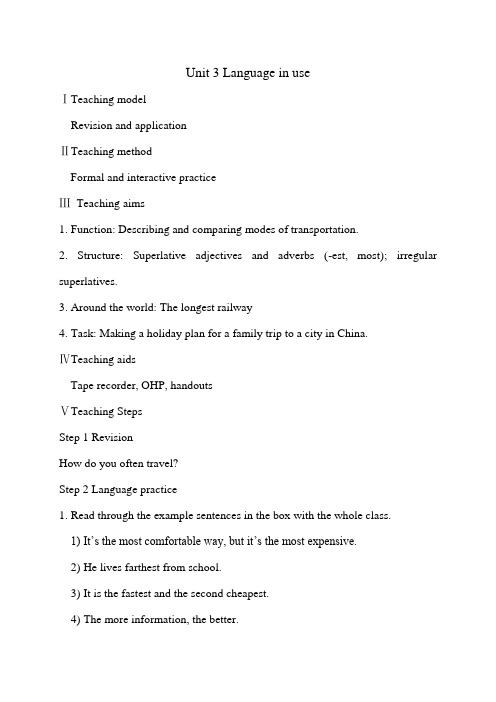
Unit 3 Language in useⅠTeaching modelRevision and applicationⅡTeaching methodFormal and interactive practiceⅢTeaching aims1. Function: Describing and comparing modes of transportation.2. Structure: Superlative adjectives and adverbs (-est, most); irregular superlatives.3. Around the world: The longest railway4. Task: Making a holiday plan for a family trip to a city in China.ⅣTeaching aidsTape recorder, OHP, handoutsⅤTeaching StepsStep 1 RevisionHow do you often travel?Step 2 Language practice1. Read through the example sentences in the box with the whole class.1) It’s the most comfortable way, but it’s the most expensive.2) He lives farthest from school.3) It is the fastest and the second cheapest.4) The more information, the better.2. Ask the students to repeat the sentences in the box.Step 3 Complete the sentences.1. Ask the students to read through the sentences in Activity 1.1) This bus takes the _________ (long) and goes the _________ (slow).2) The new train travels _________ (fast) of all the trains in the world.3) The _________ (cheap) way to get there is by coach.4) I am in a hurry. What’s the _________ (fast) way?5) The fastest way to travel is by plane, but it is also the _________ (expensive).2. Complete the sentence with the correct form of the words in brackets.3. Check the answers.Keys: 1. longest slowest 2. fastest 3. cheapest 4. fastest 5. most expensiveStep 4 Complete the conversation.1. Ask the students to read through the sentences in Activity2.a) By plane, but you have to go to the airport by taxi and that takes time too.b) The cheapest way is going by train,c) The most comfortable way is going by train, but it takes more time, thangoing by plane.d) There are three ways: by plane, by train and by coach.2. Complete the conversation with the sentences in the box.3. Check the answers.Keys: 1. d 2. a 3. b 4. c5. Read the conversation together.Step 5 Complete the conversation.1. Ask the students to read through the words in the box in Activity 3.2. Read through the conversation in Activity3.A: What’s the (1) __________ way to go to Qingdao?B: We can take a plane but that’s (2) __________. We can also take the train.It’s (3) __________,but it’s not so expensive.B: The coach is the (4) __________ way to go and it takes (5) __________ time.A: So how should we go?B: I think the best way is by train because the train station is the (6) __________ to our home.3. Complete the conversation with the correct form of the words in the box.4. Check the answers.Keys: 1. best 2. the most expensive 3. the slowest 4. cheapest5. the most6. the closest6. Read the conversation together.Step 6 Complete the word map.1. Learning to learnRemember that putting words in groups (for example, bus, train, plane, taxi) makes them easier to learn. Make sure you give your groups a title (for example, Ways of travelling). Remember also that it’s useful to learn expressions as well as the words (for example, take a bus / plane / taxi, bus stop / train station).2. Complete the word map in Activity 4.Step 7 Work in pairs.Choose a place you would like to visit. Ask and answer the questions about the ways by which you can get there.1. What’s the cheapest way to get there?2. What’s the most expensive way to get there?3. What’s the fastest way to get there?4. What’s the most comfortable way to get there?5. What’s the safest way to get there?Step 8 Complete the email.1. Ask the students to read through the words in the box in Activity 6.2. Read through the email in Activity 6.FROM: SallyTO: TonySUBJECT: Journey to ChinaHi Tony,My family is planning a journey to China in the summer. We want to visit Beijing first. Do you think we should (1) _________ the plane tickets early? After Beijing we want to visit Xi’an and Hangzhou, and maybe somewhere else. How can we (2) _________ from Beijing to Xi’an, by train or by plane? The (3) _________ is not so important, but the time is.After Xi’an, we want to go to Hangzhou. Is it better to go to Shanghai first, or can we go from Xi’an to Hangzhou directly?And after Hangzhou what’s the best (4) __________? Can we make a short (5) __________ to Suzhou? What do you think?Thanks for your help.Sally3. Complete the email with the words in the box.4. Check the answers.Keys: 1.book 2. travel 3. cost 4. choice 5. trip5. Read together.Step 9 Listening practice.1. Ask the students to read through the information in Activity 7 individually.2. Play the tape.3. Listen and match the cities with the information.4. Ask the students to check with a partner.5. Check the answers.Step 10 Listening practice.1. Ask the students to read through the questions in Activity 8 individually.1) Which city has the largest population?2) Which cities have the oldest universities in the world?3) Which city is the nearest to London?4) What are the popular places for sightseeing in London?2. Play the tape.3. Listen again and answer the questions.4. Check the answers.Step 11 Around the world: The longest railway1. Ask the students to look at the picture and discuss what they can see.2. Read through the information with the whole class.The Trans-Siberian Railway is the longest railway in the world. You can go from Moscow, the capital of Russia, to Vladivostok on the east coast. It is not the fastest way to travel from Moscow to Vladivostok, but it is the most interesting and also the most comfortable way.3. Talk something about “The longest railway”.Step 12 Module task: Make a holiday plan for a family trip to a city in China. 1. Work in groups. Make a holiday plan for a family trip to a city in China.• Find a map of China. Choose a city to visit and decide on the best way to get there.• Make a list of things to do there.•Present your plan to the class and make notes about other groups’ plans.2. Work in groups. Choose the best plan.• Use your notes to compare the different plans and decide which one is best.I think the trip to Shanghai by train is better because the journey is shorter and there are a lot of interesting places to visit in Shanghai.Step 13 Homework1. Write a holiday plan for a family trip.2. Master the new words and useful expression in Module 4.。
外研版七年级上册module 4学后检测试卷 (含答案)
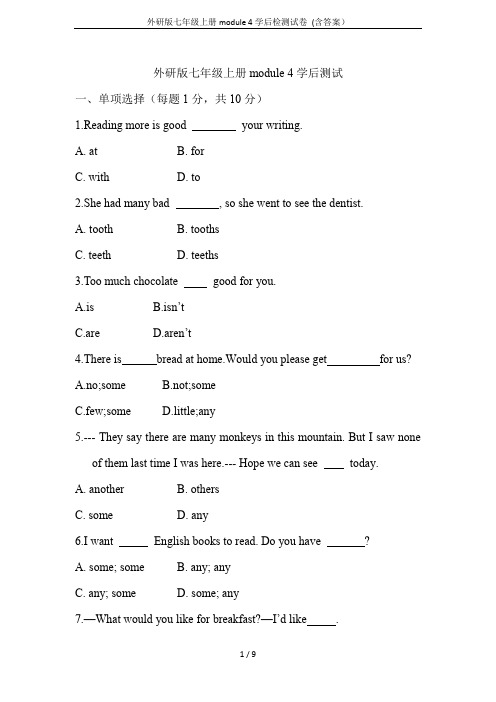
外研版七年级上册module 4学后测试一、单项选择(每题1分,共10分)1.Reading more is good your writing.A. atB. forC. withD. to2.She had many bad , so she went to see the dentist.A. toothB. toothsC. teethD. teeths3.Too much chocolate good for you.A.isB.isn’tC.areD.aren’t4.There is bread at home.Would you please get for us?A.no;someB.not;someC.few;someD.little;any5.--- They say there are many monkeys in this mountain. But I saw noneof them last time I was here.--- Hope we can see today.A. anotherB. othersC. someD. any6.I want English books to read. Do you have ?A. some; someB. any; anyC. any; someD. some; any7.—What would you like for breakfast?—I’d like.A.tomato noodleB.tomato noodlesC.tomatoes noodleD.tomatoes noodles8.—Where the books? —on the desk.A.is;It’sB.are;TheyC.are;They’reD.is;Its9.--- she got any brothers?--- No, she .A. Has; hasn'tB. Haven't; haveC. Hasn't; hasD. Have; haven't10.—Is your father a teacher or a worker?—A.Yes,he is.B.No,he isn’t.C.A worker.D.I don’t know.二、完形填空(每空1分,共10分)Most students will be 1 during exams. In order to get good 2 in the exams, they study whole day and they even forget to have lunch or supper. But this may not be a good way 3 and it even makes things worse. What should students do 4 the exam? Let’s look at the advice that the teachers give.Enough sleep is very 5 for students. So make sure you get enough 6not only on the night before the exams. You should also sleep well during the days and weeks of revision(复习) . A glass of milk is necessary before you 7 . You can take short walks in the park in a park after dinner. This can help you 8 calm(冷静).Doing some sports or listening to some music is also 9 to you. And your parents’ 10 works as well.1. A. nervous. B. relaxed C. confident D. Glad2. A. food B. grades C. glasses D. Seats3. A. to talk B. to study C. to spend D. to play4. A. before B. after C. between D. Behind5. A. interesting B. boring C. pointless D. important6. A. meat B. vegetables C. sleep D. exercise7. A. go to school B. go to the park C. go to bedD. go for dinner8. A. keep B. stop C. go D. Take9. A. cheerful B. thoughtful C. wonderful D. helpful10.A. encouragementB. embarrassment C. improvement D. Agreement三、阅读理解(每题2分,共20分)AWe all need to exercise. Doctors say it is good for us. It makes our bodies strong. It also gives us more energy(能量), and we will feel better. It's best to exercise twice a week. Twenty minutes each time is enough.There are many ways to exercise. We can walk, run, play sports or swim. Many people go to special places to exercise. These places are called “fitness centers.” These places have a lot of equipment(器材). Some people buy equipment for their homes, but it is very expensive.Exercising can be fun. Friends can exercise together at a fitness center, or they can play sports together. How do you exercise?1. What is the main idea of the passage?A. Exercise equipment is expensiveB. Playing sports is a good way to exerciseC. Every person should exerciseD. Fitness centers are popular2. We should exercise .A. every dayB. 20 minutes a weekC. twice a weekD. twice a month3. At fitness centers, .A. you can buy expensive equipmentB. people can do many kinds of exerciseC. it is very expensive to do sportsD. exercising is not fun4. Which of these kinds of exercise is not mentioned(提及) in the article?A. WalkingB. SwimmingC. RunningD. Dancing5. Which of the following sentences about exercise is TRUE?A. Exercising is expensiveB. Exercise is good for your bodyC. Only young people exerciseD. Friends can exercise together only at a fitness centerBCola isn’t good for our health.Cola is sweet,because it has sugar in it.Too much sugar can make you get fat.Drinking one bottle of cola eachday can make you get fifteen pounds(磅)each year.And because the sugar in cola can make you feel full,you should eat much healthy food,such as fruit,vegetables and rice.And cola is bad for your teeth and bones(骨头).Drink water,please.Water is very important to our body.It keeps us healthy.We get water from drink and food,especially(特别是)from fruit and vege tables.But it’s better to drink water.If you don’t like plain(清淡的)water,you can put a little 100% fruit juice into it.6.How many pounds can you get each year by drinking one bottle of cola each day?A.5 pounds.B.10 pounds.C.15 pounds.D.25 pounds.7.The underlined word “full” means .A.饥饿的B.饱的C.健康的D.甜的8.How can we get water?①By drinking milk.②By drinking soup.③By playing basketball.④By eating fruit and vegetables.A.①②③B.①③④C.②③④D.①②④9.What can we do if we don’t like plain water?A.Put some tea into the water.B.Add some ice cream to the water.C.Add some sugar to the water.D.Put a little 100% fruit juice into the water.10.What’s the best title(题目) for the passage?A.My Favourite DrinkB.Cola or WaterC.Cola Is Bad for UsD.Why Is Water Important?四、词汇运用(每空1分,共10分)1. The dish smells so d that I can't wait to eat it.2. Would you like to go s with me? I want to buy some bananas and eggs.3. Eating more v and fruit is good for your body.4. We can't eat too much c . It's bad for our health(健康).5. You can only drink tea at tea time, not c or juice.6. We should(应该) have (健康的) food very day.7. The more you practise it, the (好) you can do it.8. Jerry can play the guitar very (好).9. I have no time to have (早餐).10. This kind of ice cream is very (甜的).五、按要求完成句子(每题2分,共18分)1. 我的妹妹有一些巧克力。
- 1、下载文档前请自行甄别文档内容的完整性,平台不提供额外的编辑、内容补充、找答案等附加服务。
- 2、"仅部分预览"的文档,不可在线预览部分如存在完整性等问题,可反馈申请退款(可完整预览的文档不适用该条件!)。
- 3、如文档侵犯您的权益,请联系客服反馈,我们会尽快为您处理(人工客服工作时间:9:00-18:30)。
语法复习
三.have/has got 1.含义:拥有 2.在这个结构中,have/has是助动词,没有实在意义。 3.句式变化 肯定句:主语+have/has+sth.+其它。 否定句:主语+haven't/hasn't+sth.+其它。 一般疑问句:Have/Has+主语+sth.+其它? 注意:1.变否定句时,原句中的some要变成any; 2.変一般疑问句时,some变any,第一人称变第二人称。
7.Lucy likes rice best.(同义句) ______ _______ food is rice. 8.There is a piece of pork on the plate.(划线部分提问) 9.She has rice and meat for supper.(划线部分提问) _____ ______ she ______ for supper? 10.There are some trees in front of the house.(划线部分提问) ______ ______ _____ are there in front of the house?
句型变换: 1.She has got some bananas.(变否定句) 2.Let's go swimming at the weekend.(同义句) ______ ______ going swimming at the weekend? 3.Open the door ,please.(否定句) 4.Daming has many good friend.(变否定句和一般疑问句) 5.Cola isn't a healthy drink.(同义句) Cola ______ an _______ drink. 6.There is some water in the fridge.(变否定句和一般疑问句)
语法复习
There be/have/have got之间的区别: 一.There be句型 1.表示某地有某人或某物(存在关系) 2.构成:There is/are +sth.(n.)+介词短语。 3.句式变化: 肯定句:There is/are +n.+介词短语 否定句:There isn't/aren't +n.+介词短语。 一般疑问句:Is/Are there +n.+介词短语。 注意:1.就近一致原则,即,be动词的单复数由离
Module 4
Healthy food
1.健康食品 2.拥有 3.去购物 4.太多作业 5.对· · · 有益/有害 6.好的 7.什么种类 8.让某人做某事 9.橘汁 10.许多冰激凌
11.保持健康 12.有点累 13.喝美味的鸡汤 14.发胖 15.吃一顿好早餐 16.西式早餐 17.在西方 18.不健康的饮食 19.吃好 20.为某人买某物
用括号内所给单 photos? 2.____(be) there any meat on the plate? 3.How many _____(tomato) do you have? 4.There ______(be) some pork and ten apples here. 5.There_______(be) some oranges and some milk in the shop. 6.Daming______(have) lots of books. 7.Tom and I _____(have) the same English teacher. 8.Can she ______(ride) a bike? 9.Where are the _____(boy)? 10.There are some_______(child) on the playground. 11._____(leaf) turn green in spring. 12.She likes _____(eat) Chinese food. 13.These ____________(woman doctor) are very good. 14.We have two _____(library) in the school. 15.Could you give me_______(some) water to drink,please? 16.Let_____(he)______(come)to my office.
它最近的的名词的单复数决定: 2.含有some的句子在变否定句或一般疑问句时要 变成any.
语法复习
二.have/has 1.含义:为实义动词,有“拥有、吃、喝· · · · · ” 2.构成:某人+have/has+sth. 3.句式变化: 肯定句:主语+have/has+sth.+其它。 否定句:主语+don't/doesn't+动词原形+其它。 一般疑问句:Do/Does+主语+动词原形+其它? 回答:Yes, 主语(人称代词主格)+do/does. No, 主语(人称代词主格)+don't/doesn't.
Key sentences in Module5
1.让我们去买食物和饮料吧。 2.太多的巧克力对你不好。 3.我们没有橘子了,所以让我们买些吧。 4.你的饮食健康吗? 5.肉是健康的,但是太多肉对孩子不好。 6.记住这些很重要:吃好,保持健康并且不要 发胖! 7.多喝美味的鸡汤。 8.每天早晨吃一顿好的早餐。
